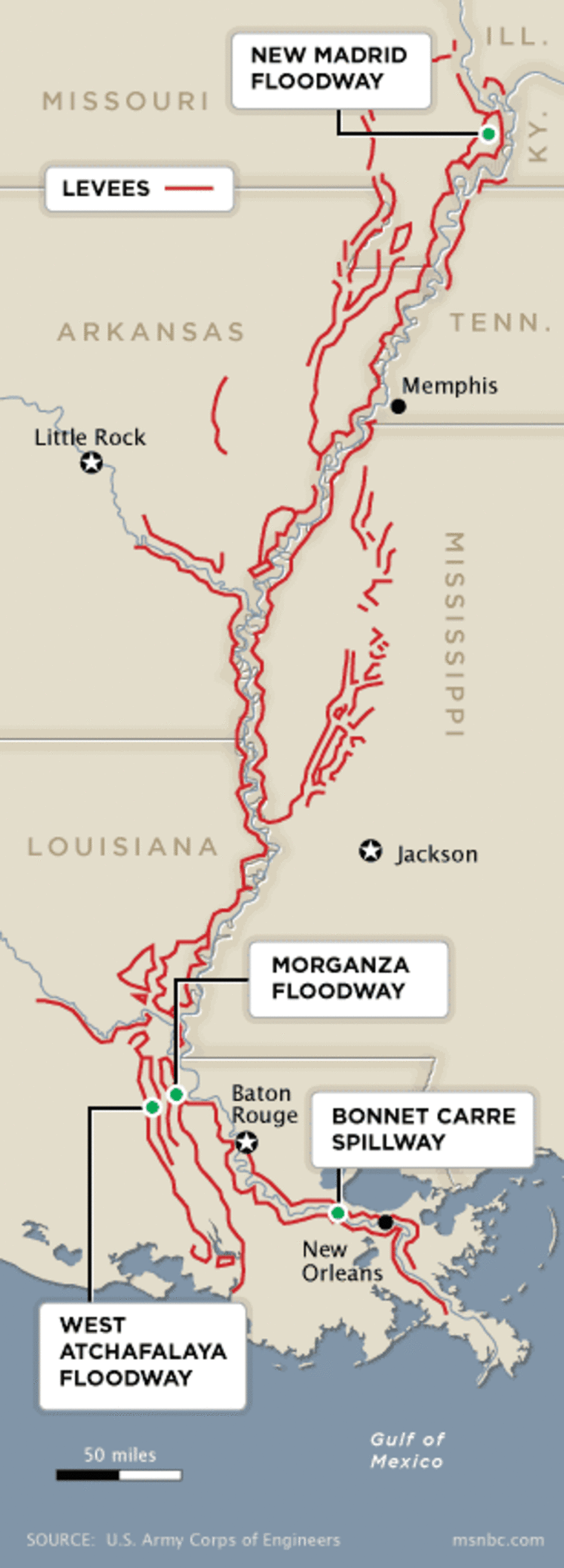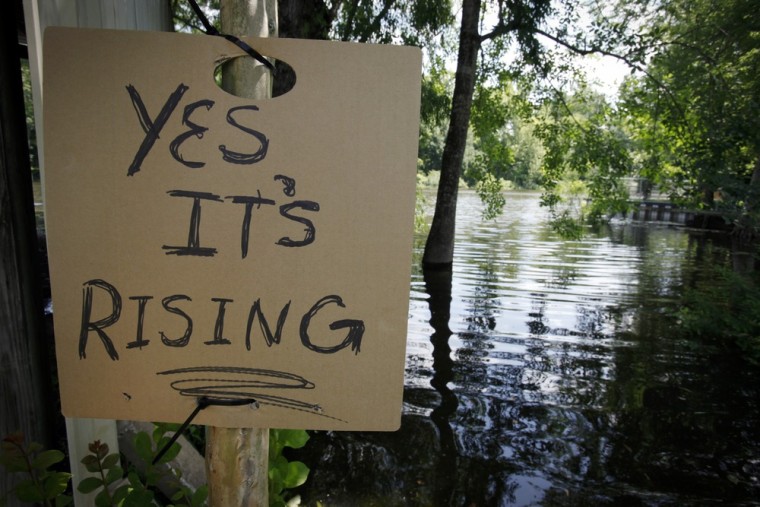While not declaring the war won just yet, officials at this Mississippi River front line on Thursday said the worst appeared to be over.
That comforted folks in and around Vicksburg, but was of no help to residents of the other front line: the Cajun country basin taking in diverted water from the massive flooding.
For Vicksburg, the turning point came when the river crested Thursday at a record 57.1 feet, 14 feet above flood level but five inches lower than predicted two weeks ago.
Locals were warned that while the river has crested, it will remain above flood stage through mid-June, putting pressure on levees that could still breach.
"This is a marathon, not a sprint," cautioned Brig. Gen. Michael Walsh, head of the Army Corps of Engineers, Mississippi Valley Division.
He noted that crews were already having to reinforce a 250-foot-section of levee weakened by a slide.
The relief was also tempered by news that the river had claimed its first fatality there.
Walter Cook, 69, died overnight apparently due to drowning, the coroner stated.
Two firefighters on a boat patrol Wednesday had spotted Cook clinging to a fence in chest-deep water. By the time they reached him, Cook was floating in the water.
Moreover, dozens of Vicksburg families have seen their homes swamped, and lives disrupted.
In one of the city's hardest-hit areas, mechanic Chris Lynn has paddled a small aluminum boat across his flooded property every day to mark the water line on his shop. Floodwater has crept close to his mobile home, though it has yet to go in.
"My son died in a car accident a few months ago, so this ain't nothing," Lynn said. "But to a lot of people, it is."

More than 4,800 people have been displaced by flooding in Mississippi, more than 2,000 of them in Vicksburg and surrounding areas. By the time the flooding ends, more than 6,000 people in Mississippi could be forced to leave their homes.
In Louisiana, meanwhile, Mississippi River floodwater diverted through the Atchafalaya River Basin is slowly swamping areas.
The area's biggest town, the oil-and-seafood hub of Morgan City, population 12,000, has been hit by one disaster after another, from hurricanes to the BP oil spill.
The Army Corps of Engineers, desperate to save Baton Rouge and New Orleans from flooding, opened a spigot on a spillway over the weekend, intentionally flooding this part of Cajun country, an area much less populated. But the cascade of water from the Morganza floodway is hampering the local oil industry and fishermen on the bayou.
Morgan City shrimper Harry Ribardi was still waiting Wednesday on the check BP promised to make up for his losses last year. Now he's facing another man-made disaster.
"This water is messing me up right now," Ribardi, 68, said in a heavy Cajun-French accent. "Even if it don't flood me, it's going to shove the shrimp way offshore where it's hard to get them."
The Morganza floodgates sent Mississippi River water down a 20-mile spillway and into the Atchafalaya River. Homes spread along the river south to Morgan City are vulnerable when the Atchafalaya spills over into the complex of bayous and lakes common in the basin.
And while Morgan City has a 20-foot floodwall that is expected to protect the town, workers have rushed sandbags into place and shored up levees just in case. National Guardsmen have zipped up and down the road along the bayou, troops loading four-ton sand bags and lugging them into place. The river is expected to crest there on May 25.
Trudy Dupuy, 62, has lived a block from the Atchafalaya River in Berwick, just outside Morgan City, for 35 years. She believed the area would be OK, in part, because the protective floodwall was raised from 9 feet to its current height of 20 feet after the 1973 flood.
"I'm not worried. This is home, I was born and raised here," she said.
In 2008, Hurricane Gustav slammed the area, and before that, Hurricane Andrew hit in 1992. Last year, the oil spill closed Gulf of Mexico fishing grounds, idling workers.
The Morganza flood gates were completed in 1954, and last opened in 1973. The unlocking of the gates was part of the drastic measures taken by Army engineers during the flood. The corps opened another floodgate north of New Orleans to send water into Lake Ponchatrain, and it blew up a Missouri levee to save the town of Cairo, Ill., sending water into 130,000 acres of farmland.
Unlike the Missouri decision, residents near the Atchafalaya basin live with the risk every year that the drain pipe could be opened. Many accept the potential dangers posed.

Each year, near the beginning of high-water season, the corps mails approximately 1,000 notices about the possible use of the spillway to known property owners and others with interests in the area, corps spokesman Ricky Boyette said. This year, a second notice went out May 6, as the likelihood of the spillway's opening increased.
Ribardi, whose 68-foot shrimp boat "Sea Chariot," is docked behind his modest, white-frame house, said spring is where the money is for shrimpers. He expects more problems in the summer months.
"The fresh water, if it hits slowly, will chase the shrimp and crabs out to sea," Ribardi said. "If it hits too fast, or if they get trapped in someplace, it will kill them."
Sterling Fryou harvests crawfish and crabs in the inland wetlands. If the flood doesn't get his house, it could create a bounty by dumping nutrients into the swampy estuaries home to the shellfish.
"In the end, we'll see bigger crawfish and crabs because of it. After the '73 flood, we had three or four really good years," said Fryou, 74.
The lanky, energetic man with a hearty laugh and a Cajun accent has been a fisherman for 60 years. Even before the flood threat, nature had not been kind this year.
"It was a bad year already because it was so dry," he said. "There was no rain to get the crawfish moving and growing. Now the current is so swift out there they are just holding on so they don't get swept away."